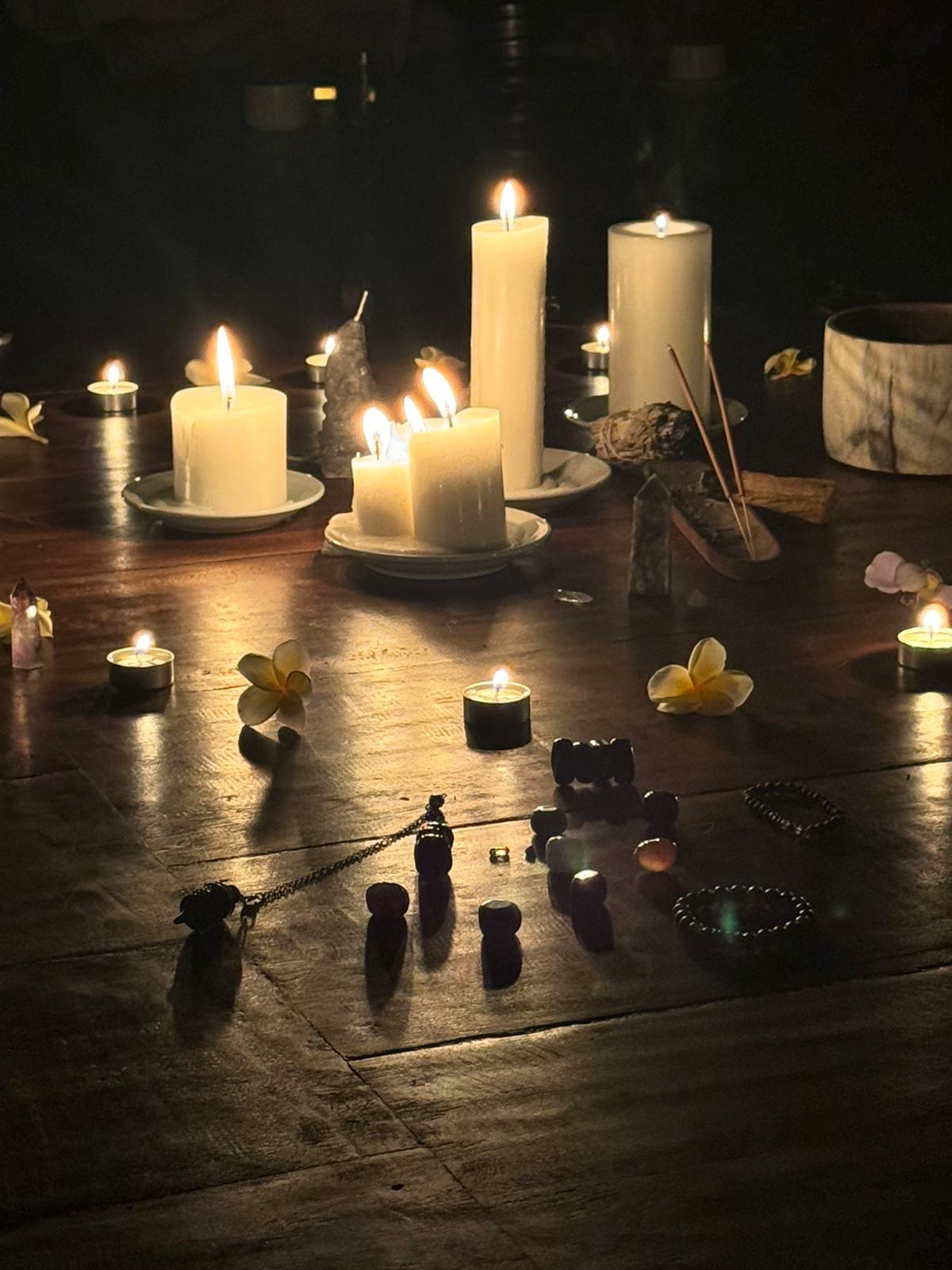Shadow work is a deeply transformative and healing practice that invites us to confront and embrace the hidden aspects of ourselves or what’s called our shadow self – the parts we often choose to ignore, deny, or suppress.
Rooted in the theories of Swiss psychologist Carl Jung, shadow work acknowledges that within each of us lies a “shadow” – a collection of repressed emotions, unresolved traumas, and unconscious beliefs that may be affecting our thoughts, behaviors, and relationships.
Our shadows naturally form as we navigate through life, encountering experiences that shape our understanding of ourselves and the world around us.
As we grow, we learn to adapt to societal expectations and cultural norms, we start to suppress the aspects of ourselves that we believe are undesirable, unacceptable, or threatening.
These disowned parts of ourselves become part of our shadow. This part of ourselves stays hidden from our conscious awareness but still influences our lives in profound ways.
Embarking on a journey of shadow work means uncovering and reintegrating these hidden aspects, fostering self-awareness, healing, and personal growth.
By illuminating the dark corners of our psyche, we can learn to recognize and embrace our innate wholeness, fostering a deeper sense of self-compassion and authenticity.
Why Uncover Your Shadow Self?
Uncovering your shadow self can lead to profound personal growth and emotional healing. By delving into the depths of your hidden emotions, desires, and beliefs through shadow work you can gain a deeper understanding of yourself and begin to embrace your true essence.
As I started to venture into the depths of my own shadow, I discovered the power to overcome the obstacles that prevented me from wholeheartedly embracing my true self.
Hidden beneath the surface were experiences from my youth that restrained me from fully owning my confidence and self-worth. By confronting and working through these mental barriers, I transformed not only my relationship with myself and others, but also unblocked my traumas around money and success. This journey of self-discovery and healing was truly life-changing, opening the door to a more authentic and vibrant existence.
If that’s not enough to make you want to uncover your hidden side, here are a few of the countless reasons why uncovering your shadow self is essential:
Self-awareness: Exploring your shadow self allows you to cultivate a heightened sense of self-awareness, enabling you to recognize patterns and triggers in your thoughts, emotions, and behaviors. This understanding can empower you to make conscious choices that align with your authentic self.
Emotional healing: Through shadow work, you can reveal unresolved emotions, past traumas, or deeply rooted beliefs that may be holding you back from living a fulfilling life. By addressing these hidden aspects, you can begin to heal emotional wounds and release the burden of past pain.
Personal growth: Embracing your complete self, rather than just your conscious self, can lead to tremendous personal growth, as it challenges you to face your fears, confront your limitations, and develop a deeper understanding of your strengths and weaknesses. This growth can lead to an increased sense of self-confidence and resilience.
Authenticity: When you uncover and integrate your shadow self, you are embracing your full, authentic self. This authenticity can improve your relationships, as you become more open, honest, and compassionate with both yourself and others.
Inner harmony: Acknowledging and embracing your shadow self can lead to a greater sense of inner harmony, as you learn to accept and love yourself in your entirety. This acceptance can promote a sense of inner peace and emotional balance.
Empowerment: Uncovering your shadow self can help you reclaim your power and take responsibility for your own emotional well-being. By recognizing and addressing the hidden aspects of yourself, you can begin to make more conscious decisions and take control of your life.
How To Find Your Shadow Self
At this point, you might be wondering, if our shadow self is hidden in the subconscious, how do I actually start doing shadow work to uncover this part of myself?
There are many ways to start shining a light on the darker areas of your psyche, but here’s how I’ve approached it:
Cultivate self-awareness: Start by simply becoming more aware of your thoughts, emotions, and reactions. Observe how you respond to different situations, especially those that provoke strong emotions. Pay attention to any patterns you see yourself doing, or things (or people) that trigger you. These are the things that will provide insight into your shadow self.
Explore your past: Like most things in the realm of psychology, taking a look back at your formative years can give you a lot of insight into your shadow self.
Delve into your childhood and past experiences, as they often shape the formation of your shadow. Reflect on any traumas, challenging experiences, or memories that have had a lasting impact on you. Consider how these events may have contributed to the development of your shadow self.
Journal your thoughts: Writing about your feelings, memories, and experiences can help you gain a deeper understanding of your shadow self. Journaling encourages self-reflection, allowing you to explore your emotions and identify recurring themes or patterns in your life.
Engage in meditation and mindfulness: Practice meditation and mindfulness to cultivate a deeper connection with your inner self. These practices can help you become more aware of your thoughts and emotions, making it easier to recognize and explore your shadow self.
Seek support: Finding your shadow self can be a challenging and emotional process. Seek support from trusted friends, family members, therapists, or support groups who can provide guidance, encouragement, and a safe space to share your experiences.
Identify your projections: We often project our shadow aspects onto others, blaming them for the qualities we don’t want to acknowledge in ourselves. Pay attention to the traits or behaviors that trigger strong reactions in you, as they can provide clues about your shadow self.
Embrace your shadow: Rather than denying or suppressing your shadow self, embrace it as a part of your whole being. Accepting and integrating your shadow self can lead to profound personal growth, self-acceptance, and healing.
Practice self-compassion: Remember that finding your shadow self can be an emotionally challenging journey. Be gentle with yourself and practice self-compassion as you navigate the process of self-discovery and healing.
Explore your dreams: Dreams often hold symbolic meaning and can provide insight into your subconscious mind. Pay attention to recurring themes, symbols, or emotions in your dreams, as they can offer clues about your shadow self. Consider picking up a dream journal and a dream interpretation book to uncover what your dreams are trying to tell you.
Practice forgiveness: As you uncover aspects of your shadow self, you may experience feelings of guilt, shame, or regret. It’s important to practice forgiveness, both for yourself and others, to facilitate healing and personal growth.
Use creative expression: Engaging in creative activities such as writing, painting, or dancing can help you access and express your shadow self. These forms of expression allow you to explore your emotions and thoughts in a safe and constructive way.
Develop a daily practice: Consistently dedicating time to self-reflection and shadow work can help you maintain a strong connection with your shadow self. Set aside time each day to journal, meditate, or engage in other self-discovery practices.
Embrace vulnerability: Confronting your shadow self requires vulnerability and courage. Allow yourself to be open and honest with yourself about your feelings, fears, and desires. While this might seem like a no-brainer, we are very good at tricking ourselves. But it takes vulnerability to cultivate profound personal growth and self-acceptance.
Recognize your triggers: Be mindful of situations, people, or emotions that trigger your shadow self. Acknowledging these triggers can help you better understand and manage your reactions.
Cultivate self-love: Learning to love and accept all aspects of yourself, including your shadow self, is crucial for emotional well-being and personal growth. Embrace your unique qualities, strengths, and weaknesses, and celebrate the person you are.
Set healthy boundaries: As you become more in tune with your shadow self, it’s essential to establish healthy boundaries in your relationships. This can help prevent unhealthy patterns and ensure that your emotional needs are met.
Remember that finding your shadow self is an ongoing journey that requires dedication and commitment. Stay open to new insights and experiences, and be prepared to face challenges and setbacks along the way. With perseverance and a willingness to grow, you’ll continue to uncover the depths of your shadow self, leading to a more authentic and fulfilling life.
To facilitate your exploration of your shadow self, consider asking yourself the following 20 questions as prompts for shadow work.
Remember to approach this process with self-compassion, curiosity, and an open heart.
What emotions or situations do I tend to avoid or suppress?
What are my most significant fears, and how do they impact my life?
In what ways do I self-sabotage or hold myself back?
What qualities do I admire in others that I feel I lack?
What triggers me, and why do these situations provoke a strong reaction?
What childhood experiences or traumas might still be affecting me today?
How do my relationships with others reflect the relationship I have with myself?
What negative patterns or beliefs do I carry about myself, others, or the world?
How do I cope with stress or emotional pain, and are these coping mechanisms healthy?
What aspects of myself do I find challenging to accept or embrace?
In what ways do I seek validation, approval, or love from others?
How do I deal with anger, and do I express it in a healthy way?
What are my core values, and do my actions and choices align with them?
What masks do I wear in different situations or relationships?
Are there any recurring themes or patterns in my dreams or nightmares?
How does my inner critic show up, and what messages does it send me?
In what ways do I engage in self-care, and are there any areas where I neglect my own well-being?
What are my boundaries, and how well do I enforce them in my relationships?
How do I handle conflict, and is it in a healthy and constructive way?
What lessons can I learn from my shadow, and how can I integrate these insights into my life?
As you work your way through these questions, give yourself the time and space to delve deeply into your inner world. Journaling or sharing your thoughts with a trusted friend, therapist, or support group can help facilitate your shadow work journey.
Have you been doing the work? Tell me about your experience with shadow work in the comments below.











